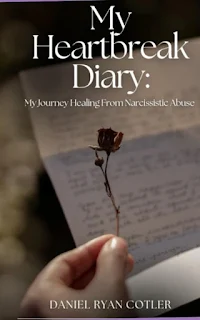A comprehensive lists of relationship red flags https://danielryancotlerauthorandpoet.godaddysites.com/
1. Excessive Self-Centeredness
2. Lack of Empathy
3. Manipulation
4. Grandiosity
5. Need for Admiration
6. Entitlement
7. Exploitative Behavior
8. Difficulty Maintaining Relationships
9. Anger and Aggression
10. Fragile Self-Esteem
11. Jealousy and Envy
12. Boundary Violation
13. Projection
14. Isolation
15. Constant Need for Attention
16. Difficulty Apologizing
17. Triangulation
18. Lack of Accountability
19. Sensitivity to Criticism
20. Superficial Charm
21. Love-Bombing
22. Emotional Vampirism
23. Chronic Victim Mentality
24. Inconsistent Behavior
25. Unrealistic Expectations
26. Hoarding of Resources
27. Boundary Testing
28. Hiding Objects
29. Future Faking
30. Consistent Lack of Respect
31. Blaming Others for Their Problems
32. Excessive Control
33. Frequent Mood Swings
34. Disregard for Your Well-being
35. Refusal to Compromise
36. Isolating You from Loved Ones
37. Frequent Lies or Deception
38. Stonewalling
39. Unresolved Past Issues
40. Extreme Jealousy
41. Substance Abuse Issues
42. Failure to Communicate
43. Excessive Financial Dependence
44. Lack of Support for Your Goals
45. Gaslighting
46. Emotional Blackmail
47. Constantly Speaking Negatively About Others
48. Unresolved Anger or Resentment
49. Consistently Dismissive Attitude
50. Emotional or Physical Abuse
51. Frequent Sarcasm or Mockery
52. Overly Secretive Behavior
53. Unrealistic or Extreme Expectations
54. Consistent Criticism of Your Loved Ones
55. Excessive Focus on Material Possessions
56. Chronic Neglect of Your Needs
57. Refusal to Communicate About Issues
58. Unwillingness to Seek Help
59. Unrealistic Jealousy
60. Chronic Avoidance of Conflict
61. Lack of Personal Growth
62. Continuous Disregard for Your Feelings
63. Reluctance to Spend Quality Time Together
64. Emotionally Unavailable
65. Ignoring Your Safety Concerns
66. Routinely Withholding Information
67. Pattern of Betrayal
68. Consistently Late or Unreliable
69. Lack of Respect for Your Time
70. Compulsive Gossiping
71. One-Sided Communication
72. Disinterest in Compromise
73. Ignoring Your Personal Goals
74. Pattern of Dishonesty in Previous Relationships
75. Failure to Keep Promises to Others
76. Inability to Celebrate Your Achievements
77. Constant Critique of Your Friends
78. Recurring Negative Attitude Toward Life
79. Ongoing Reckless Behavior
80. Compulsive Lying About Trivial Matters
81. Refusal to Acknowledge Their Own Mistakes
82. Continuous Emotional Coldness
83. Inability to Show Affection
84. Refusal to Apologize Sincerely
85. Frequent Crisis Creation
86. Pattern of Over-Indulgence in Substances
87. Ignoring Your Safety Concerns
88. Unwarranted Attempts to Isolate You
89. Reluctance to Spend Quality Time Together
90. Consistent Flakiness with Plans
91. Compulsive Over-Sharing
92. Emotionally Unavailable
93. Ignoring Your Safety Concerns
94. Continuous Disregard for Your Feelings
95. Reluctance to Spend Quality Time Together
96. Emotionally Unavailable
97. Chronic Insecurity
98. Ignoring Your Safety Concerns
99. Routinely Withholding Information
100. Relentless Pushing of Personal Beliefs
101. Compulsive Seeking Revenge
102. Consistent Deflection of Emotions
103. Using Threats of Self-Harm
104. Refusing to Share Responsibilities
105. Pattern of Cheating in Past Relationships
106. Inability to Accept Apologies Sincerely
107. Unwarranted Attempts to Isolate You
108. Extreme Mood Swings
109. Sudden Change in Values or Beliefs
110. Lack of Personal Growth
111. Continuous Disregard for Your Feelings
112. Reluctance to Spend Quality Time Together
113. Emotionally Unavailable
114. Ignoring Your Safety Concerns
115. Routinely Withholding Information
116. Relentless Pushing of Personal Beliefs
117. Compulsive Seeking Revenge
118. Consistent Deflection of Emotions
119. Using Threats of Self-Harm
120. Refusing to Share Responsibilities
121. Pattern of Cheating in Past Relationships
122. Inability to Accept Apologies Sincerely
123. Unwarranted Attempts to Isolate You
124. Extreme Mood Swings
125. Sudden Change in Values or Beliefs
126. Lack of Personal Growth
127. Continuous Disregard for Your Feelings
128. Reluctance to Spend Quality Time Together
129. Emotionally Unavailable
130. Ignoring Your Safety Concerns
131. Chronic Neglect of Household Responsibilities
132. Unexplained Disappearances
133. Pattern of Betrayal
134. Consistently Late or Unreliable
135. Lack of Respect for Your Time
136. Compulsive Gossiping
137. One-Sided Communication
138. Disinterest in Compromise
139. Ignoring Your Personal Goals
140. Pattern of Dishonesty in Previous Relationships
141. Failure to Keep Promises to Others
142. Inability to Celebrate Your Achievements
143. Constant Critique of Your Friends
144. Recurring Negative Attitude Toward Life
145. Ongoing Reckless Behavior
146. Compulsive Lying About Trivial Matters
147. Refusal to Acknowledge Their Own Mistakes
148. Continuous Emotional Coldness
149. Inability to Show Affection
150. Refusal to Apologize Sincerely
151. Frequent Crisis Creation
152. Pattern of Over-Indulgence in Substances
153. Ignoring Your Safety Concerns
154. Unwarranted Attempts to Isolate You
155. Reluctance to Spend Quality Time Together
156. Consistent Flakiness with Plans
157. Compulsive Over-Sharing
158. Emotionally Unavailable
159. Ignoring Your Safety Concerns
160. Continuous Disregard for Your Feelings
161. Reluctance to Spend Quality Time Together
162. Emotionally Unavailable
163. Chronic Insecurity
164. Ignoring Your Safety Concerns
165. Routinely Withholding Information
166. Relentless Pushing of Personal Beliefs
167. Compulsive Seeking Revenge
168. Consistent Deflection of Emotions
169. Using Threats of Self-Harm
170. Refusing to Share Responsibilities
171. Pattern of Cheating in Past Relationships
172. Inability to Accept Apologies Sincerely
173. Unwarranted Attempts to Isolate You
174. Extreme Mood Swings
175. Sudden Change in Values or Beliefs
176. Lack of Personal Growth
177. Continuous Disregard for Your Feelings
178. Reluctance to Spend Quality Time Together
179. Emotionally Unavailable
180. Ignoring Your Safety Concerns
181. Routinely Withholding Information
182. Pattern of Betrayal
183. Consistently Late or Unreliable
184. Lack of Respect for Your Time
185. Compulsive Gossiping
186. One-Sided Communication
187. Disinterest in Compromise
188. Ignoring Your Personal Goals
189. Pattern of Dishonesty in Previous Relationships
190. Failure to Keep Promises to Others
191. Inability to Celebrate Your Achievements
192. Constant Critique of Your Friends
193. Recurring Negative Attitude Toward Life
194. Ongoing Reckless Behavior
195. Compulsive Lying About Trivial Matters
196. Refusal to Acknowledge Their Own Mistakes
197. Continuous Emotional Coldness
198. Inability to Show Affection
199. Refusal to Apologize Sincerely
200. Frequent Crisis Creation

.jpeg)



.jpeg)








